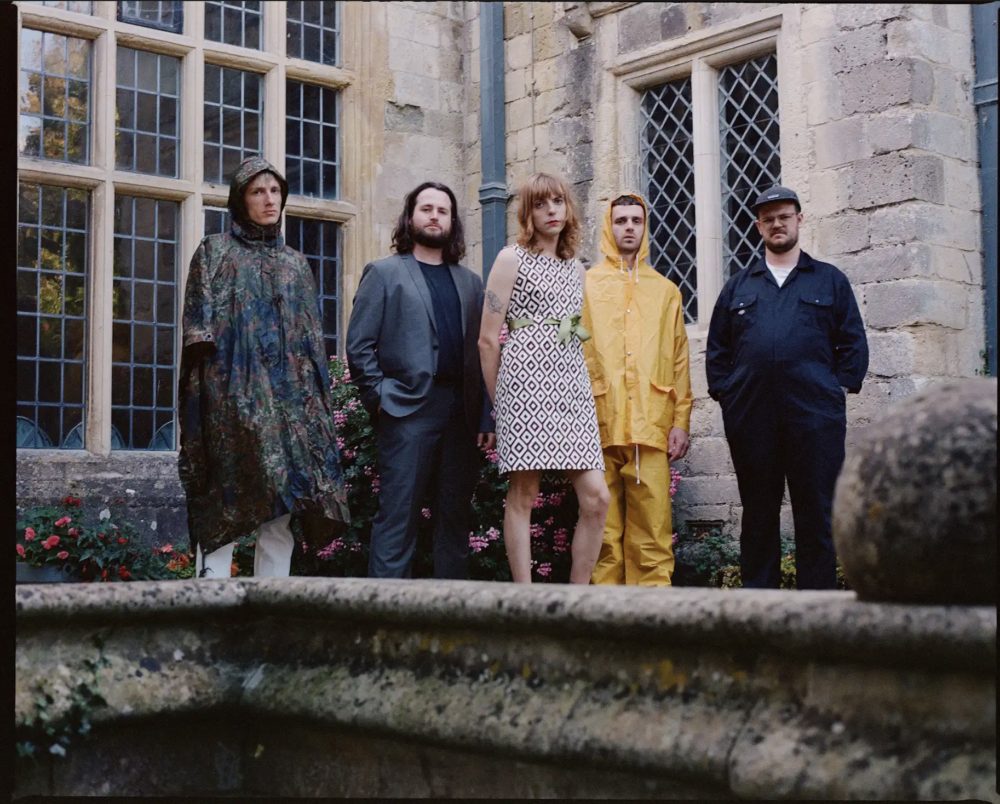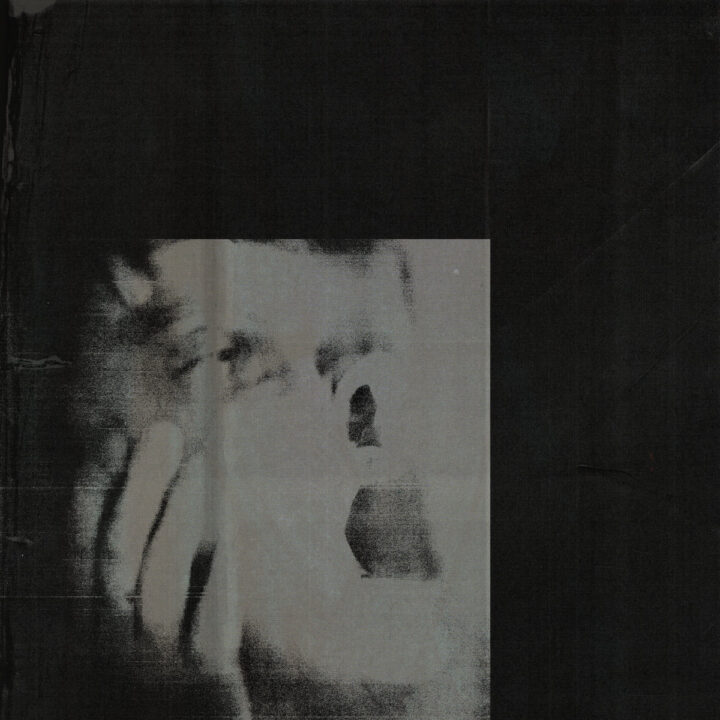Band To Watch: DITZ

Pedro Takahashi
There is a poltergeist lurking within the Brighton quintet DITZ’s music. At first, it’s a creeping unease: guitars that panic like an unscheduled alarm, bass that feels like unseen eyes stalking you. Then it evolves into annihilating chaos: vocals teetering on sociopathy and drums as relentless as landmines. Since forming in 2015, DITZ have honed their craft of ominous tension. Where their debut project EP1 is devolved noise, like a haunted house hell-bent on ridding itself of any unsuspecting family, their forthcoming album Never Exhale is a more exacting brand of sinister. It’s an escalation in possession years in the making.
“I love it when bands can sort of scare you with a bit of music. That’s cool,” Vocalist C.A. Francis shares over a zoom call, alongside guitarists Anton Mocock and Jack Looker. “That’s one of the things that would be an essential ingredient is that sense of menace. But, I think it’s just finding different ways to do that.” Looker recalls a friend who reached out and complimented their new music — yet admitted he has to “prepare” before listening to DITZ because their music genuinely terrifies the shit out of him. It’s welcomed praise. “That’s the best compliment ever, almost,” Looker laughs. “Big thumbs up.”
Francis, Looker, Mocock, bassist Caleb Remnant, and drummer Sam Evans create music that’s more than just unwelcome pandemonium — it’s a psychological thriller, invested in atmosphere rather than cheap franchise jumpscares. They draw from a rich history of hardcore, post-hardcore, bleak avant-garde, and experimental noise-pop (Big Ups, Fugazi, the Fall, the Jesus Lizard, the Psychotic Monks, Scott Walker) with literary and pop culture references to unearth as many distinct shades in their grayscale of terror sound.
From DITZ’s perspective, terror isn’t necessarily the intention but the result of common interests. “One of my favorite bands in the world, by far, especially over the last few years is Xiu Xiu. On a fear register, they’re like up there,” Francis says. “We’re like a mouse to an elephant, compared to whatever they are.”
“I never really found our music that scary until people started pointing it out,” Looker clarifies. “For me, it’s embodying bits from my favorite bands — the quiet and loud thing that’s well-documented that the Pixies used to do and the spooky bits of Dead Kennedys. Bands like Sorry have got kind of spooky bits, but it’s still got a bit of pop structure in there.”
DITZ’s formation feels more like a gradual evolution than a single origin story. “When does a band really start? How long is a piece of string? You can’t really say what the definitive moment was,” Francis says, reflecting on an accurate starting point for the group as they approach a decade. Francis and Remnant went to college together in Brighton to study music and were eager to begin a band. They met guitarist Mocock first. The three attended the Mutations Festival, where watching Blacklisters, Lightning Bolt, METZ, and Ought inspired the brash, menacing energy as a jumping off point. It wasn’t until the following year that they’d have a name and their first release EP1. Their finalized lineup would come a few years later with Evans and Looker.
They toured their debut LP The Great Regression — a delirious, maniacal depiction of bodily limitations and moral thresholds in our spectacle-obsessed capitalist-flagellating world, which was written in isolation during lockdown — while supporting bulging-vein rockers IDLES. It’s on the road that they took their suspenseful compositions to another level, penning new stuff and mutating songs past their recorded boundaries. (Over the years, EP1’s “No Thanks, I’m Full” has morphed from its four-minute beginnings to a seven-minute teenage stage and into a mature 12-minute spiral.)
“That’s the reason to go write new songs, so you can go and play the shows,” Francis says. “Life is a set number of hours. [If] you record one album and then don’t really tour it very much, it wouldn’t feel like much of a chunk of my life, to be honest. I think it’s important to really put the time into something that you’ve made — it’s like that 10,000 hours thing.” They go on to describe the importance of playing live to maximize a song’s potential and grow as a group — vetting a crowd’s reaction, testing songs over a proper sound system, and transforming a composition’s tension.
This is essentially how their forthcoming album Never Exhale came to be. “When we were writing, we’d be doing it out of necessity on days off because we needed new songs to play so we weren’t playing the same set every night,” Francis explains. “I guess it’s not just about time. It’s about how you spend the time as well.”
That tension not only exists in their distortive boom and busts, but Francis’ unsettling lyrics that delight in doom-filled ambiguity. Unsettling, visceral vignettes cushion striking one-liners. “I feel like death/ I wonder if he feels like me too,” opens Never Exhale’s “Senor Siniestro,” which is then followed by verses that detail the crunchy death of snails and dogs suffering in a locked car. “And misery to me, is like water to a fish/ I swim through the reef and observe/ Everything and everyone all at once.” Their voice is blistering and splintered, basking in decay and no promise of the future. The album is also peppered with literary nods from Joseph Conrad’s Heart Of Darkness, grasping at “the horror, the horror,” on “Body Is A Structure” and relating to Franz Kafka’s Josef K. on “God On A Speed Dial.” The imagery is striking and tactile without acting as a guiding legend, emphasizing DITZ’s affinity for disorientation.
“It’s like Kurt Vonnegut or something like that. I think the sonic order is the most important one. What’s going to have the most impact? That’s also the first thing that you’re going to get on the first lesson as well,” Francis says. “We’re not very sort of explicit with the message. You have to dig through a bit. On the first listen, there’s nothing for anybody to object to, unless they’re really listening for it,” they explain.
Is this strategic in avoiding online scrutiny or a philosophical artistic approach? “I think it’s both. Maybe some of it comes from sort of a natural shyness, and that’s a way of guarding it,” Francis says. “I love unpicking a puzzle. That’s what I like in other lyricists, that’s what I like in other writers, so that’s how I would naturally do it. I think maybe it’s because of a certain shyness or something that maybe a bit measured with the words, because I’m maybe not like that in person, especially after a few drinks —”
Looker interrupts. “You’re definitely not like that,” he laughs.
“That’s why, when I’ve got some time to think and pick through words, that it’s probably going to be a bit more of a measured response,” they add.
Maybe DITZ’s calculated turmoil isn’t haunted after all. Maybe it’s an invitation to exercise our own grisly shadows. Looker recalls an interaction from touring where a fan thanked the band for “writing music that allows people to fucking process those emotions, or, let those emotions out by not beating the shit out of each other at the same time —”
“Apart from when they do,” Francis smirks.
Never Exhale is out 1/24 via Republic Of Music/Domino.







